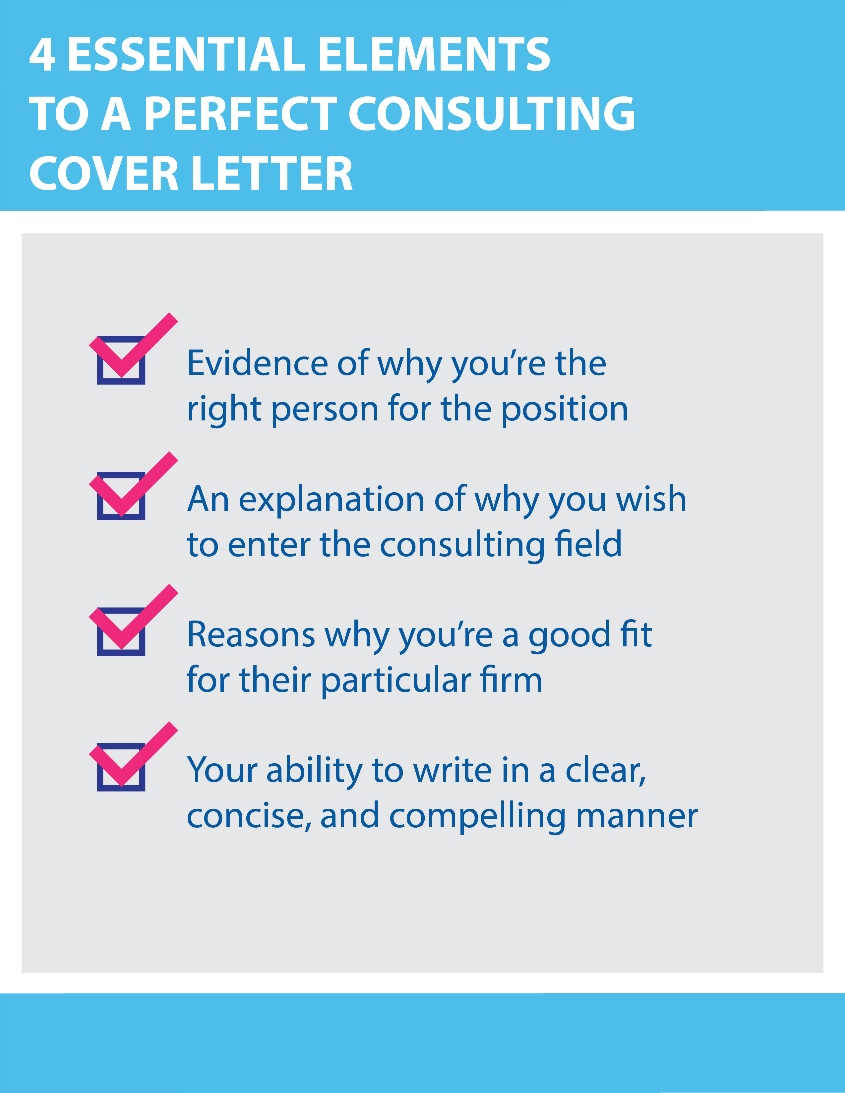FREE Resume Tips Email and Video Series
This form collects your name and email so that we can add you to our email list that delivers the free resources you are requesting. Check out our privacy policy for details on how we protect and manage your submitted data.
We’ll never spam you or share your email. Unsubscribe at any time.
Your cover letter can make a big difference when applying for a management consulting position. Because the cover letter is typically read before your resume, it plays an essential chronological role during the application process.
Consulting firms will typically read your cover letter to quickly identify what makes you different from thousands of other applicants. Therefore, writing a strong and unique cover letter can make you stand out from the competition and ensure that your achievements aren’t overlooked.
A strong cover letter presents an excellent opportunity for you to demonstrate why you’re the best candidate for the job, and to plead your case as to why the firm should hire you over other applicants.
This guide will cover 11 essential steps towards writing the perfect consulting cover letter.
Tip 1 — Know What Consulting Firms Are Looking For
The top consulting firms receive hundreds of thousands of applications each year. For example, McKinsey receives approximately 200,000 applications annually, of which only 2,000 applicants receive an offer. Consulting firms are faced with the arduous task of narrowing down the candidate pool to include only the best.
Interviewing candidates is not a cheap process. The firm wants to ensure that any candidate they interview is qualified for the position, is prepared for management consulting as a career, and is a good fit for the firm.
Therefore, top consulting firms look for four essential elements in a cover letter.
- Evidence of why you’re the right person for the position
- An explanation of why you wish to enter the consulting field
- Reasons why you’re a good fit for their particular firm
- Your ability to write in a clear, concise, and compelling manner

When reading cover letters, screeners will often ask,“Did the applicant spend enough time preparing a strong letter? Have they done their homework regarding the firm and the position in question? Do they have adequate writing skills to prepare compelling emails, reports, and presentations?“
A cover letter is a challenging document to prepare. You may feel worn out after spending hours on your resume, only to realize that you also need to spend as much time (if not more) on your cover letter.
Rather than looking at your consulting cover letter as an annoying extra step, think of it as an excellent opportunity to emphasize your skills and experiences and to set yourself apart from other applicants.
Tip 2 — Make Sure the Letter Has TheseFiveDistinct Sections
While your cover letter doesn’t need to take a formulaic approach, there are five distinct sections that should be covered. They are:
- An Introduction
The introduction should contain which position you’re applying for, your name, address, and contact information. It should also be short, sweet, and entertaining. Write it in such a way that the screener will want to keep reading into the second paragraph.
- Why You’re a Great Candidate
This is the section where you should blow your own horn. Each sentence should speak to your skills, education, and experiences — tying everything back to why you’re a great candidate. Ideally, this section should include your top three achievements to date (relevant to consulting, of course).
- Why Consulting is the Right Fit for You
Remember that the top priority of most consulting firms is to find out whether you’ll become a great consultant if hired. Even with memorable and unique qualifications, a recruiter may not be convinced that these skills will make you a good management consultant. To leave no doubt in their mind, dedicate a section towards explaining why you’re the right person for the job. You can use previous experiences (such as internships, jobs, or academic courses) to tie your career goals to the position in question.
- Why You’re Applying for the Position
The next section should cover why you chose to apply for this exact position in this firm. When laying out your case, identify unique reasons as to why you think McKinsey, Bain, BCG, Deloitte, or any other firm is your firm of choice. To make a compelling argument, identify specific people, reports, or projects that make your story believable. Don’t hesitate to mention specific employees or projects that caught your eye and sparked your interest.
- A Solid Conclusion
Finalize the letter by restating why you believe you’re a great candidate and how you can be of value to the company.
Tip 3 — LinkYour Cover Letter to Your Resume

A consulting cover letter is essentially an opportunity for you to expound on the information you wrote in your resume. What does this mean? It means that your cover letter should highlight the unique achievements, skills, and experiences (relevant to the position) that make you stand out from other applicants.
Your resume and cover letter should work hand in hand to strengthen your application further and demonstrate what makes you stand out.
Start off by identifying what you want the consulting firm to know about you. Draw attention to your career achievements. Maybe you started a business and sold it for a significant profit, or you worked overseas for a few years and have a diverse skillset.
Make sure that unique experiences are mentioned in the first few paragraphs of your cover letter to pique the interest of the resume screener.
Many resume screeners don’t actually read your entire resume.They simply scan it to identify specific items that make you stand out. Because resume screeners scan through hundreds of resumes at a time, they can easily overlook your unique achievements.
The cover letter is your opportunity to prevent this from happening. When you go into detail about achievements in your cover letter, you essentially draw the attention of screeners (and thus give yourself a better chance to land an interview).
Tip 4 — Don’t Forget About Your Resume
Even after referencing the unique skills you have in your cover letter, you need a strong consulting resume to back up your claims. A consulting resume is different from other standard template resumes, as it needs to emphasize a combination of skills that can make you successful as a consultant.
Here are resources that can help you prepare a strong consulting resume. A quality consulting resume will take just as much attention to detail as writing a strong cover letter will. In a nutshell, writing a consulting resume requires you to reflect on your past experiences, select the ones that are most relevant to consulting, and summarize them in a manner that resume screeners can easily scan and digest.
Top consulting firms typically look for the following in your resume:
- Big brand names (employers and schools)
- Strong academic performance (high GPA)
- Strong analytical skills (demonstrated in high standardized test scores)
- Strong leadership and communication skills
- Achievements versus career years (the longer your career is, the more achievements that screeners expect to see)

Also, refer to this resource to identify the top five mistakes that applicants make when writing a consulting resume.
Tip 5 — Avoid Using a Standard Template for Your Cover Letter
It’s no secret that it can be a pain to write a strong cover letter. It takes a lot of time and reflection. You’ll have to revise and edit the piece multiple times before submitting it. But, to truly stand out from other applicants, your letter needs to be interesting, personal, and unique.
The biggest mistake you can make is to copy a standard cover letter template and simply plug in your name and skillset. Screeners hate standard form letters because they’re boring to read, and they show that you’re unwilling to put in the necessary time and effort to write something unique. Because recruiters read thousands of cover letters, they can easily tell when a cover letter is written from a template.
When writing your consulting cover letter, make sure that every sentence is unique. While you may draw inspiration from various templates, add your personal twist to each word and modify it in a manner that emphasizes your unique skillset. For example, instead of starting with the usual format:
“Dear Sir/Madam, I write to apply for a consulting position….”
You can make things more interesting by starting off with what makes you different. Here’s an example:
“After attending Harvard for both my undergraduate and MBA education, I am confident in my ability to become successful as a [insert job position here] at McKinsey.”
Another example:
“My experiences overseas as a Peace Corps volunteer put me in a position to be successful as a [insert job position here] at BCG.”
The idea is to make every sentence in your cover letter count. Add a personal twist to all ofyour skills and experiences and tie them to the job responsibilities of the open position.
Tip 6 — Highlight Your Skills and Experiences via Evidence-Based Storytelling
In your cover letter, the goal should be to tell your story. Rather than simply listing your skills and abilities, demonstrate how various experiences have molded you into the perfect candidate for the position in question. Strive to show that you have what it takes, instead of telling.
For instance, instead of simply stating that you can lead, give a specific example of an experience where you showed leadership qualities. This evidence-based approach shows recruiters that your prior experiences have equipped you with the necessary skills to be successful.
Telling a story makes your cover letter much easier to read. It also makes you stand out from thousands of other applicants who may simply state “I’m a leader,” or, “I’m a hard worker.”
As you use this evidence-based approach, tailor every experience you mention to a specific skillset that is required for the job. If the position requires a candidate with strong interpersonal skills, explain a time when you worked within a team to achieve tangible results. Also, list out any challenges and how you overcame them.
It’s not simply about telling a story. Rather, it’s about telling a story that highlights why you’re a good fit for the job, as well as what makes you stand out from the competition.
Tip 7 — Show Your Value
A common mistake that many applicants make is to only think about personal achievements when applying for consulting positions. Recruiters often read through cover letters that have lots of “me meme” in them.
This is to say that many applicants focus on how they can benefit personally from the position in question, instead of demonstrating how they can become valuable employees (and eventually partners).
Many cover letters talk only about how the candidate will be able to elevate his/her career, experiences, and skills. Such letters only focus on personal goals instead of demonstrating how you can help the company become better. Remember that screeners are looking for candidates who will be of benefit to the firm, not those who are simply using this as an opportunity to enrich themselves and their careers.
When writing your cover letter, emphasize how your skillset will be of benefit to the company. To do this successfully, you need to do your research with regards to what the short-term and long-term goals of the firm are. You can then use these goals and relate them to your unique abilities and experiences.
Tip 8 — One Page Is the Perfect Length
It can be tempting to write a long cover letter, especially if you have a diverse skillset that you feel should be highlighted. However, being concise and keeping it relevant to the position is a much better strategy.
Aim to select only the most relevant experiences that apply directly to the position you’re seeking. You can typically fit these experiences in only one page.
Being concise also makes it easier for recruiters to read through your cover letter quickly without overlooking anything. Edit it down to a concise letter by re-reading and adjusting your original cover letter. The more you read it, the more unnecessary words and content you will find to take out.
Start early so that you can give yourself plenty of time to adjust your cover letter accordingly.
Tip 9 — Be Specific About the Position You’re Applying To
While this may sound obvious, many applicants tend to go off on a tangent about their skills and abilities without first mentioning the job they’re applying for. You should always state the position and office of the job you intend to apply for within the first sentence.
Remember that this information can still be included as you emphasize what makes you different. Here’s an example of an opening sentence that was used earlier in this guide:
“My experiences overseas as a Peace Corps volunteer put me in a position to be successful as a [insert job position here] at BCG.”
Being specific and concise about the job you’re applying for will make it easier for screeners to quickly recognize which position you are interested in.
Tip 10 — Give Yourself Time to Write a Quality Letter
Similar to consulting resumes, writing a strong consulting cover letter takes time. To be successful, you need to consider everything you’ve accomplished as well as what makes you different from everyone else. Don’t think that you can write a strong cover letter in one night. It requires multiple iterations, careful re-reading, and timely feedback.
You also need to make sure that the cover letter blends seamlessly with your resume, and it expounds on the outstanding skills and experiences contained in the resume itself.
Tip 11 — Proofread Thoroughly

And finally, make sure you eliminate any grammatical or spelling mistakes from the final cover letter. These mistakes make you appear careless and can result in being disqualified in the screening process. Don’t let something so simple be your downfall.
Take time to proofread. Ask peers and fellow professionals review your cover letter and give you feedback as well.
Example
Here is an example cover letter that highlights the tips I’ve mentioned. Reference this example as you write your cover letter to make sure that you hit all of the important sections. These items do not necessarily need to appear in the order I have them listed. But, make sure that they are all represented in your cover letter. Below is an example consulting cover letter.
You can also download the example by clicking here.

More Resources:
Free Case Interview Prep Program – Sign Up For Free Instant Access to the Largest Collection of FREE Case Interview Training Resources.
We’ll never spam you or share your email. Unsubscribe at any time.




219 thoughts on “Consulting Cover Letter Tips (and Template)”
Hi Victor
Trust you are doing good. I am regular visitor at your website and have been reading your book. I am a second year analyst with a big 4 audit firm in their strategy consulting practice. Before I put across my query, I would sincerely like to acknowledge the fact that the insights you share in your book / emails are extremely relevant and helpful for a aspiring strategy consultant and I have greatly benefited from them.
I seek your advise to help me evaluate my profile for strategy consulting at MBB and the approach to target the same.
My post is a bit longer than the average post on the website. I apologise for the length /detail and appreciate all the assistance
My background
Positives
Strong undergraduate degree in finance with honours from a top commerce college in India ( equivalent to 3.7 GPA)
Two years of experience in strategy Consulting : 12 assignments( market entry, feasibility study, commercial due diligence , business plan/business plan review, financial modelling, sales and pricing strategy) with exposure to sectors such as media, healthcare, logistics, automobile and hospitality
Well versed with strategy consulting frameworks : both corporate strategy and m&a and advised bulge bracket PE funds on deals that have gone live
I would be joining university of Cambridge (target school) for a post experience master degree in finance in september
Perceived negatives
No standardised test score ( admission to Cambridge was profile based)
Transition to MBB
Though my masters degree is a post experience degree in finance (technically an MBA equivalent) its not an MBA
Areas of concern
How I should structure my covering letter.How do I state the obvious shift from top 8 to top 3.
what position should I apply for ( associate/consultant level or junior associate/junior consultant)
Would my work experience make case interviews harder for me in terms of expectations of the interviewer since I have done something similar in past.
Once again I appreciate all the assistance that you have been providing
Many thanks in advance
Prateek
Prateek,
This is a tough one as you are right on the borderline for applying to the undergrad vs post MBA roles. You could really go either way. If it were me, I’d aim for the more junior role. The post MBA’s have more experience. Better to aim a little lower and get in the door somehow and work from there. If you opted to target the post MBA role, it’s definitely not a mistake and you would definitely have a shot at it.
Do you have college entrance exam scores? If so I Clyde those in lieu of GRE scores. An undergrad % rank would work as well.
The Cambridge experience is a very good transition opportunity. No need to explain the desire to move for big 4 to MBB. Nobody is going to think you are crazy or anything, the Cambridge name as a transition point is really ideal. It “upgrades” your status somewhat and improves your odds of being considered.
In your cover letter explain, you’ve had a good experience at your firm, you have been invited back (assuming that is true) and you’re looking at other options in a field you really like… Use the Cambridge experience as your excuse for taking a look at your options.
Cases are cases period. The standard is largely similar. They will however expect you to be able to know the projects listed on your resume forwards and backwards, so be sure you can explain what you did two years ago, key insights, the approach you took, why you did what you did, etc.. Sometimes the stuff from a few years ago is hard to explain if you haven’t had to do so in a while. If it is on the resume, be prepared to be grilled on it.
Good luck,
Victor
I meant to say, what would you recommend would be key points to bring up in my cover letter?
Hi Victor,
I have found your advice and materials provided on http://www.caseinterview to be very helpful in my job search. Recently, I purchased your series on consulting resumes and it has really opened my eyes to what recruiters are looking for in a resume. It also gave me an idea of whether I am even competitive in a candidate pool and where I would have more chances of getting an interview.
As a University of Michigan College of Engineering graduate, I am pursuing a career in consulting. After graduation in April 2012, I worked for Schlumberger (World’s largest oilfield service company) as a Field Engineer for 6 months. I have also been a very active member of Society of Women Engineers on collegiate and professional level. The problem is that I am no longer a ‘recent graduate’ and I am also switching careers at a very early stage in my career from engineering to consulting. What would you recommend would be key points to bring up in my resume?
Thank you,
Sarah
Sarah,
In your cover letter, you’re going to have to explain the “elephant in the room” question as to why you’re changing fields so early in your career. I’m going to assume what you’re doing now is not a good fit for you, but you will need to explain that in a little more detail… And explain why consulting doesn’t have any of these drawbacks.
Your employer is well known so that’s not a big issue. If your Michigan stats were pretty solid, you want to mention yor GPA and scores in your cover letter as well.
The tricky part will be your work experience, have you worked long enough to have accomplished anything meaningful? If yes, definitely include that. If not, that’s not a deal breaker. It just means there will be more weight placed on your Michigan experiences and any internships while you were there.
Good luck,
Victor
Hi Victor,
I have recently completed my MBA and also hold an MS in Electrical Engineering. Having worked in engineering for about 15 years with really strong background in Operations, I want to get into Technology/Business Strategy consulting. How receptive you think consulting firms would be toward a profile like mine? Meaning, do they see having both Engineering and Business skills much differently then just Business?
Regards,
Raj
Raj,
It is very difficult to say given the limited information you provided. It depends on the caliber of the school where you got your MBA and MS, your grades, your test scores, what you specifically accomplished during the 15 years in engineering (e.g., were you an exceptional engineer or did you just show up everyday for 15 years — big difference).
Those factors aside I don’t see anything that would disqualify you from being considered. The operationally oriented consulting firms tend to value industry experience more than the strategy one. The strategy ones are biased a little more towards pedigree and achievement levels within industry (slightly less so on what you were successful at).
You might also take a look at my “Do I qualify?” self assessment matrix in my consulting resume toolkit. I think it’s as https://www.caseinterview.com/consulting-resume
Good luck,
-Victor
Dear Victor,
I have bachelors and masters degrees in engineering (from 2 of the best University’s in the UK) and a year’s experience of working with the internal sustainability advisory of a large MNC. I am considering moving to a role in consulting. What should I highlight in my cover letter to consulting firms.
Degrees, university brand name, any kind of standard test score (especially one that’s good) name of the large MNC (assuming its well known). But all the above in the first paragraph.
The general rule of thumb — the most impressive, most credible, most universally recognizable things FIRST to ensure nobody misses it.
Don’t assume the read the whole cover letter. Assume they SCAN the cover letter to see if any keywords jump out, and if they see something interesting they slow down to read the cover letter, and then the resume with much greater care.
-Victor
-Victor
Thank you for this post. It has helped to change my semi-standard cv and covers,in something very tailored to my skills, experience, Today is Sunday but i have spent more than 3 hours to create a CV Cover that replace myself for this Job that i love.
Luca,
Great. Good luck!
-Victor
Think there is some trouble again to access the videos, am I correct?
Cheers
Jacob
Jacob,
The videos should all be working. However, they are often not viewable from China due to firewall issues.
-Victor
Hey Victor!
First off, thank you for all your hard work and educating me about all you know in consulting. I’ve been a long-time reader and have always wanted to break in, but haven’t had things go my way since I graduated in 2011.
A quick breakdown, non-target 3.3/4.0 gpa (which I know isn’t great), but I believe I have great work experience. Interned at start-up PE firm, temp-job at JPM, and have been working for a year at Morgan Stanley in a very analytical role. I have known since my Junior year in college that I wanted to get into consulting and want to get in even more now because I have been miserable in the industry work I cover.
I don’t have my eyes set on MBB as I really just want to get into consulting and enjoy the work. I’ve networked a bit and have a few close contacts at a few Big4 firms. What do you think my chances are to break into tier-2/tier-3 firms?
Thank you 🙂
Brian
Brian,
I think give your work experiences and notable employers, I think tier 2 or 3 is a distinct possibility. Morgan Stanley carries a lot of weight.
It will depend on
1) the prestige level of your non-target school. If it’s a 3.3 at a community college that’s one thing, if it’s at say UCLA that’s different.
2) test scores – if your test scores are much higher than your gpa would suggest, that suggests high ability but perhaps not applied while in school. This would be a favorable interpretation that you want to hope for.
If the non-target school were well known and the test scores were pretty good, combined with Morgan Stanley, I think at least some (but probably not all) of the firms would consider taking a look.
It will help a LOT if you have contacts in these firms. Relationships can overcome resume “deficits”.
Good luck,
-Victor
Hi Victor,
I recently completed my MEng in Mechanical engineering (4 year undergrad master’s program) in 2012 from the University of Bristol, UK. I got a first class degree, which places me in the top 10%-15% of the class (we don’t have a GPA system at our university).
After my degree, I took a few months off due to some personal commitments and am now looking for jobs, back in my home country of India. Through my interactions with quite a few consultants, I am quite certain that I want to pursue management consulting as a career. However, I do not have any prior work experience in consulting.
I have really enjoyed reading through your book and am trying to practice case interviews using your techniques.
I would be grateful if you could help me with the following areas:
1. How do I make sure that my cover letter stands out since I do not have any consulting experience?
2. I do not have a partner to practice. So, how do you think would be the best way to practice? I have been reading businessweek and trying to analyse cases on my own, but is this the best way to do it?
Thank you.
Regards,
Nav
Nav,
1) It’s not necessary to have consulting experience to get a consulting job. In fact, the majority of new hires do not have prior consulting experience.
In your cover letter, you want to emphasize the types of skills that consulting firms look for in candidates.
* Ability to do math / think logically (in any context — science, business, engineering, math, non-profits, medicine)
* Ability to work with very diverse people (in any setting — CEO’s, 6 year old children in grade school, men, women, blue collar workers, white collar professionals, multi-cultural groups, students, etc.. )
Basically the same skills you want to highlight in a resume, you want to highlight on your cover letter. For more info on resume skills to highlight, see below:
https://www.caseinterview.com/consulting-resume
For case partner practice, take a look at http://www.CaseInterviewPartner.com – this helps you find partners to practice with via Skype. Should be accessible in a few days.
-Victor
Hi Victor,
I have been your reader for a while, but only interested in consulting recently. I have a quick question for you. I noticed that firms really care about SAT scores since they ask to put that in the application. My SAT score is pretty low I guess (around 2000 with CR 580 and Math 770). Would I not be able to get interview (especially with MBB) just because of a low SAT score?
Thank you for your help and all the stuffs on this website.
Viet
Viet,
The short answer is yes, it is entirely possible to not get an interview (especially with MBB) due to a low SAT score.
They generally tend to care more about the math score than the rest, but they do consider it.
The reason is when the firms analyze the consultants they hire and then 2 years later promote (or fire), those that are promoted tend to have a SAT score (or other standardized test) in a particular range. Also, in the past, a percentage of the consultants that don’t get promoted, had scores below that range.
I know it seems very superficial — especially for experienced hires (and I know you’re probably a potential campus hire) who are asked about their SAT scores from 10 – 15 years ago.
However, I have seen in person that some people just do not have the logical thinking and critical reasoning power that’s needed to go head to head with a CEO client with 30 years industry experience (vs the consultant’s 1 year experience), and to diplomatically prove the client wrong.
THAT is not easy to do.
So a high math test score doesn’t guarantee success in consulting, but a low one does predict struggles (at least by MBB standards. The standards for the rest of the top 10 is lower, but they still look at the scores too).
-Victor